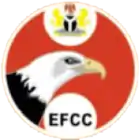Economic and Financial Crimes Commission
The Economic and Financial Crimes Commission (EFCC) is a Nigerian law enforcement agency that investigates financial crimes such as advance fee fraud (419 fraud) and money laundering.[1] The EFCC was established in 2003, partially in response to pressure from the Financial Action Task Force on Money Laundering (FATF),[2] which named Nigeria as one of 23 countries non-cooperative in the international community's efforts to fight money laundering.[1] The agency has its head office in Abuja, Nigeria.[3]
| Economic and Financial Crimes Commission | |
|---|---|
 | |
| Abbreviation | EFCC |
| Agency overview | |
| Formed | 2003 |
| Jurisdictional structure | |
| Federal agency (Operations jurisdiction) | Nigeria |
| Operations jurisdiction | Nigeria |
| Legal jurisdiction | Economic and Financial crimes |
| Governing body | President of Nigeria |
| Constituting instrument |
|
| General nature | |
| Specialist jurisdiction |
|
| Operational structure | |
| Headquarters | Plot 301/302, Institution and Research Cadastral District Jabi. Abuja |
| Agency executive |
|
| Website | |
| https://www.efccnigeria.org | |
History
Under the previous EFCC chairman Nuhu Ribadu, the agency has addressed financial corruption by prosecuting and convicting a number of high-profile corrupt individuals, ranging from Nigeria's former chief law enforcement officer to several bank chief executives. By 2005, the EFCC arrested government officials including, Diepreye Alamieyeseigha.[4]
In September 2006, the EFCC had 31 of Nigeria's 36 state governors under investigation for corruption.[5] In December 2007, the Nigerian Federal Government, after extensive investigations by EFCC and other organisations, cleared the Vaswani brothers[6] of any wrongdoing and invited them back into the country. Leading Nigerian daily "This Day" and other major newspapers reported the facts of their clearance quoting text from FG issued directives. In April 2008, the EFCC began an investigation of the very influential daughter of the former Nigerian President, Senator Iyabo Obasanjo-Bello for receiving N10 million ($100,000), stolen from the Ministry of Health. The former Health Minister and her deputy are currently on trial for stealing over N30,000,000 ($300,000) from the ministry's unspent funds from last year.
On June 6, 2008, Chief (Mrs) Farida Mzamber Waziri was sworn in as the new chairperson of the EFCC.[1] Then on the 6th of August 2008, the former chairman Nuhu Ribadu was demoted from Assistant Inspector General (AIG) to Deputy Commissioner of Police (DCP).[7]
On September 14, 2010, the head of the Forensic Unit of the EFCC, Abdullahi Muazu, was assassinated in Kaduna. He had been actively involved in the trials of several heads of banks.[8]
Waziri was dismissed by President Goodluck Jonathan on 23 November 2011 and replaced by Ibrahim Lamorde as Acting Chairman, who has since been confirmed on the 15 February 2012 by the Nigerian Senate.[9]
Ibrahim Lamorde was sacked by President Muhammadu Buhari on November 9, 2015, and replaced with Ibrahim Magu. The Nigerian Senate refused to confirm Magu as chairman of the agency twice due to security reports by law enforcement agencies in the country.
On July 6, 2020, Magu was arrested by operatives of the Department of State Services and the Nigeria Police Force and driven to the Presidential Villa where he was made to answer questions on alleged corruption against him. He was detained overnight and on July 7 was suspended from his position as chairman of the agency pending the completion of the investigation.
On July 10, 2020, President Muhammadu Buhari approved the immediate suspension of Ibrahim Magu as acting chairman of the Economic and Financial Crimes Commission (EFCC) in a statement issued by the Office of the Attorney-General of the Federation, Abubakar Malami. President Muhammadu Buhari also approved that the EFCC Director of Operations, Mohammed Umar Abba, should take charge and oversee the activities of the Commission pending the conclusion of the ongoing investigation and further directives.
Mission statement
To rid Nigeria of Economic and Financial Crimes and to effectively coordinate the domestic effort of the global fight against money laundering and terrorists financing.[10]
Vision
An agency operating to best international standards and leading the fight against economic and financial crimes in Nigeria.[10]
References
- "The Establishment Act". Economic and Financial Crimes Commission. 2008. Archived from the original on 2008-01-30. Retrieved 2007-05-17.
- Kenton, Will. "Financial Action Task Force (FATF)". Investopedia. Retrieved 2020-05-30.
- "Head Office Archived 2011-04-11 at the Wayback Machine." Economic and Financial Crimes Commission. Retrieved on 25 July 2011. "Head Office No5 Fomella Street, Off Adetokunbo Ademola Crescent Wuse II Abuja."
- "Nigeria arrests runaway governor". BBC. 9 December 2005. Archived from the original on 21 October 2007. Retrieved 2007-05-17.
- "Nigeria governors in graft probe". BBC. 28 September 2006. Retrieved 2007-05-17.
- http://www.vanguardngr.com/2009/11/court-declares-deportation-of-vaswani-brothers-illegal/
- "NUHU RIBADU: IS YARÁDUA LEADING A GOVERNMENT OR A GANG?". Nigeria World. 8 August 2008. Retrieved 2008-09-17.
- "Gunmen kill EFCC's forensic team leader in Kaduna". NEXT. 15 September 2010. Archived from the original on 18 September 2010. Retrieved 2010-10-04.
- "Waziri's Sack And The Future Of EFCC". P.M. News. November 28, 2011. Retrieved 2011-12-22.
- https://efccnigeria.org
External links
- https://www.efccnigeria.org – Official website
- EFCC Related news
Press
- Nigeria’s struggle with corruption, presented by the chairman of the EFCC to the US Congressional House Committee on International Development
- Banks take a breath of fresh air as FATF gives clean bill of health
- Nigeria: EFCC intensifies probe of health ministry, ThisDay newspaper, March 2008